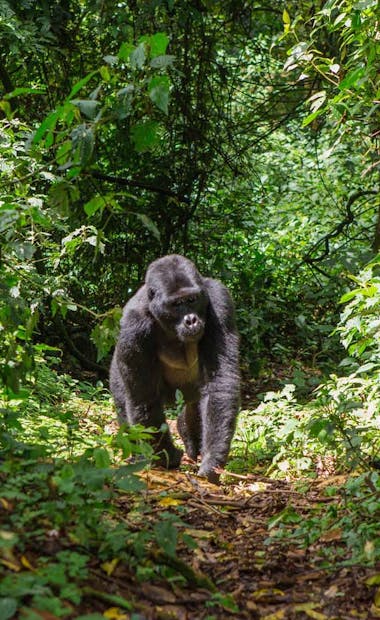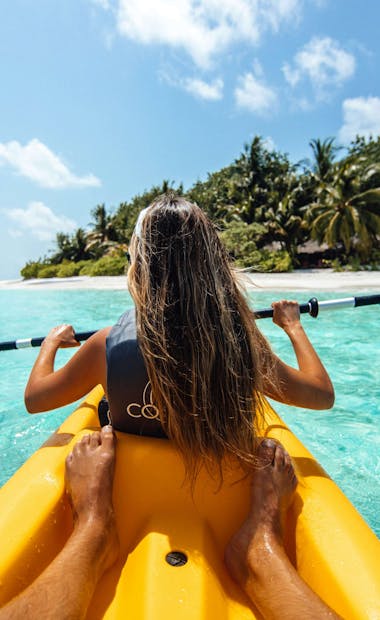
Uganda Tours
Small Group Guided Adventures In Uganda
Popular tours
- Save26%
 View Tour
View TourGorillas of Uganda Overland Safari & Participation Camping - 9 Days
- Kampala to Kampala
- Age group: 15 - 100
- Max group size: 22
Was:£2,479From£1,841 - Save18%
 View Tour
View TourGorillas, Chimps & Nile River - 9 Days
- Kampala to Jinja
- Age group: 16 - 75
- Max group size: 18
Was:£1,430From£1,169 - Save13%
 View Tour
View TourGorillas, Chimps & Nile River (Accommodated) - 9 Days
- Kampala to Kampala
- Age group: 16 - 75
- Max group size: 18
Was:£1,750From£1,526 - Save1%
 View Tour
View TourUganda Overland: Gorillas & Chimps - 9 Days
- Kampala to Kampala
- Age group: 18 - 39
- Max group size: 22
Was:£2,479From£2,454 - Save1%
 View Tour
View TourUganda Gorilla Trek Independent Short Break - 4 Days
- Kampala to Kampala
- Age group: 15 - 99
- Max group size: 12
Was:£2,195From£2,173 - Save1%
 View Tour
View TourEssential Uganda and Gorilla Trek - 9 Days
- Entebbe to Entebbe
- Age group: 18 - 35
- Max group size: 16
Was:£2,650From£2,624
Uganda Tours
Embark on an unforgettable adventure with our captivating Uganda tours and experience the magic of this hidden gem in East Africa. Nestled between the vast savannahs of Kenya and the vibrant jungles of the Democratic Republic of Congo, Uganda is a land of astonishing beauty and rich biodiversity. From awe-inspiring landscapes to rare wildlife encounters, Uganda has it all, making it the perfect destination for your dream holiday.
Immerse yourself in the wonders of Uganda's diverse landscapes, where the lush greenery of national parks meets the dramatic peaks of the Rwenzori Mountains. Begin your journey with a thrilling safari in Queen Elizabeth National Park, home to an abundance of wildlife, including majestic elephants, tree-climbing lions, and herds of buffalo. Witness the mesmerizing sight of the tree-climbing lions perched on ancient fig trees, surveying their territory with regal poise.
For an experience like no other, venture into Bwindi Impenetrable Forest, a UNESCO World Heritage site and sanctuary to the endangered mountain gorillas. Trek through dense foliage, guided by experienced trackers, until you find yourself face to face with these gentle giants in their natural habitat. Witnessing the gorillas' playful interactions and observing their human-like behavior is a truly humbling and transformative experience.
As you traverse Uganda's diverse landscapes, don't miss the chance to cruise along the legendary Nile River and encounter the powerful Murchison Falls. Marvel at the sheer force of nature as the mighty river squeezes through a narrow gorge, creating a thunderous spectacle and a captivating display of raw power.
Uganda's captivating beauty extends beyond its wildlife. Explore the tranquil shores of Lake Victoria, the largest freshwater lake in Africa, and discover the vibrant culture of Uganda's capital, Kampala. Wander through bustling markets, where the aroma of exotic spices fills the air, and engage with friendly locals who will warmly welcome you into their vibrant communities.
For the adventurous souls, embark on adrenaline-pumping activities such as white-water rafting on the Nile, zip-lining through forest canopies, or trekking to the summit of Mount Elgon. These thrilling experiences will ignite your spirit of adventure and create memories that will last a lifetime.
But it's not just the remarkable attractions that make Uganda a must-visit destination; it's the warmth and hospitality of its people that truly sets it apart. The Ugandan spirit is infectious, and you'll be captivated by the genuine smiles and friendly greetings of the locals who are proud to share their country's treasures with you.
Uganda is a country that embraces its natural wonders and cultural heritage, providing a unique and enriching experience for every traveler. Whether you seek wildlife encounters, breathtaking landscapes, or cultural immersion, Uganda has it all. Let our expertly crafted Uganda tours unlock the beauty and magic of this extraordinary destination, ensuring an unforgettable journey that will leave you longing to return again and again. Start planning your Uganda holiday today and let the adventure begin.
When is the best time to visit Uganda?
The best time to visit Uganda largely depends on your specific interests and the activities you plan to undertake during your trip. Uganda enjoys a relatively stable climate throughout the year, but there are a few factors to consider when determining the ideal time for your visit.
The dry seasons, which are generally considered the best time to visit, occur from December to February and from June to September. These months offer pleasant temperatures and less rainfall, making it easier to navigate through the national parks, trek in the mountains, and engage in outdoor activities.
The dry seasons are particularly advantageous for gorilla trekking in Bwindi Impenetrable Forest and Mgahinga Gorilla National Park, as the trails are less muddy, and the chances of rainfall disrupting your trek are minimized.
However, it's worth noting that Uganda's unique landscapes and wildlife are accessible and enjoyable year-round. Even during the wet seasons, from March to May and from October to November, Uganda retains its beauty and offers its own set of advantages. The landscapes are lush and green, wildlife is still abundant, and there are fewer crowds, allowing for a more intimate experience with nature.
It's important to remember that Uganda's climate can vary in different regions due to variations in altitude. The southwestern highlands, including Bwindi Impenetrable Forest, experience cooler temperatures, while the northern plains, such as Murchison Falls National Park, can be hotter.
If you're interested in birdwatching, Uganda is a paradise all year round, with migratory birds visiting between November and April. During this time, birding enthusiasts can witness an incredible diversity of species.
Ultimately, the best time to visit Uganda depends on your preferences and the specific experiences you're seeking. It's advisable to consult with your travel agency or tour operator, who can provide personalized advice based on your interests and the activities you wish to undertake.
Will I need a visa to travel to Uganda?
Yes, most travellers visiting Uganda will need a visa to enter the country. Uganda offers different types of visas, including the Single Entry Visa, Multiple Entry Visa, and East Africa Tourist Visa.
Single Entry Visa: This visa allows you to enter Uganda once and stay for a specified period, usually up to 90 days. It is suitable for tourists who plan to visit Uganda only.
Multiple Entry Visa: If you plan to leave Uganda during your trip to visit neighboring countries like Kenya or Rwanda and then return to Uganda, the Multiple Entry Visa is recommended. It allows multiple entries within a specified period, usually up to 6 or 12 months.
East Africa Tourist Visa: This visa allows travel between Uganda, Kenya, and Rwanda without the need for separate visas for each country. It is ideal for travelers who wish to explore multiple destinations within the East African region.
To obtain a visa for Uganda, you can apply online through the official e-visa website or through the Ugandan embassy or consulate in your home country. Make sure to check the latest visa requirements and application process, as they can vary depending on your nationality.
It's important to apply for your visa well in advance of your trip to allow for processing time. Ensure that your passport has at least six months of validity remaining from the date of entry into Uganda.
As visa requirements can change, it's advisable to consult with the Ugandan embassy or consulate in your country or check official government websites for the most up-to-date and accurate information regarding visa requirements for your specific nationality
What are the must see destinations in Uganda?
Uganda is a country blessed with an abundance of natural wonders and captivating destinations. Here are some must-see places to include in your itinerary when visiting Uganda:
Bwindi Impenetrable Forest: This UNESCO World Heritage site is renowned for its population of endangered mountain gorillas. Trek through the dense forest to encounter these majestic creatures up close and witness their captivating behavior in their natural habitat.
Murchison Falls National Park: Located along the Nile River, Murchison Falls National Park offers breathtaking landscapes and incredible wildlife encounters. Take a boat cruise to witness the powerful waterfall where the Nile squeezes through a narrow gorge, creating a dramatic cascade.
Queen Elizabeth National Park: Famous for its diverse ecosystems, Queen Elizabeth National Park is home to a wide variety of wildlife, including elephants, lions, hippos, and an abundance of bird species. Take a safari drive or boat cruise along the Kazinga Channel to witness the park's beauty.
Kibale National Park: Known as the primate capital of East Africa, Kibale National Park is home to a large population of chimpanzees. Embark on a trek to observe these intelligent creatures in their natural habitat and listen to their echoing calls through the forest.
Lake Bunyonyi: Discover the serenity of Lake Bunyonyi, one of Uganda's most beautiful lakes. With its scenic surroundings, dotted with islands and hills, this tranquil oasis is perfect for relaxation, canoeing, and birdwatching.
Rwenzori Mountains National Park: Experience the thrill of trekking through the mystical Rwenzori Mountains, also known as the "Mountains of the Moon." These snow-capped peaks offer stunning vistas, diverse ecosystems, and an adventurous challenge for hikers and mountaineers.
Kidepo Valley National Park: For those seeking remote wilderness and off-the-beaten-path adventures, Kidepo Valley National Park is a hidden gem. With its rugged landscapes and incredible wildlife diversity, including lions, cheetahs, and giraffes, this park promises a unique and unforgettable experience.
Jinja: Located on the shores of Lake Victoria, Jinja is known as the adventure capital of Uganda. Engage in adrenaline-pumping activities like white-water rafting on the Nile, kayaking, bungee jumping, or quad biking.
These are just a few highlights of Uganda's remarkable attractions. The country also offers cultural encounters, vibrant markets, and opportunities to interact with local communities. Whether you're a nature lover, adventure seeker, or cultural enthusiast, Uganda's diverse destinations have something to offer every traveller.
What is the local currency in Uganda, and can I use credit cards?
The local currency in Uganda is the Ugandan Shilling (UGX). It is advisable to carry some local currency for smaller purchases, tips, and transactions in more remote areas. You can exchange your currency for Ugandan Shillings at banks, authorized exchange bureaus, or at major hotels.
Credit cards are widely accepted in larger cities and tourist areas of Uganda. Visa and Mastercard are the most commonly accepted cards, while American Express and other less common cards may have limited acceptance. However, it's important to note that outside of major establishments, cash is often the preferred method of payment.
ATMs are available in major cities and towns, allowing you to withdraw cash in Ugandan Shillings using your debit or credit card. It's advisable to inform your bank or credit card company about your travel plans to ensure smooth transactions and to inquire about any applicable fees for international withdrawals or transactions.
While credit cards can be used for larger purchases, it's recommended to carry some cash for smaller expenses, street markets, or remote areas where card payment options may be limited.
It's important to keep your cards and cash secure and be cautious when using ATMs or making card transactions to minimize the risk of fraud or theft. It's advisable to have a mix of payment methods, including cash and cards, to ensure flexibility during your travels in Uganda.
Is Uganda a good family holiday destination?
Yes, Uganda is indeed a wonderful family holiday destination with a wide range of activities and attractions suitable for all ages. Here are some reasons why Uganda is a great choice for a family vacation:
Wildlife Encounters: Uganda is known for its diverse wildlife, including the opportunity to see majestic mountain gorillas in their natural habitat. A gorilla trekking experience can be an awe-inspiring and educational adventure for children and adults alike.
Safari Adventures: Embarking on a safari in Uganda's national parks is an exciting experience for the whole family. The chance to spot elephants, giraffes, lions, zebras, and other wildlife up close is a thrilling and educational experience that children will remember for a lifetime.
Nature and Scenic Beauty: Uganda's landscapes are incredibly diverse, ranging from lush rainforests to savannah plains and picturesque lakes. Families can enjoy activities such as boat cruises, nature walks, and birdwatching, immersing themselves in the country's natural beauty.
Cultural Experiences: Uganda is rich in cultural heritage, and visiting local communities can provide a unique and enriching experience for families. Children can learn about different cultures, traditions, and ways of life, gaining a broader understanding of the world around them.
Adventure Activities: Uganda offers a variety of adventure activities suitable for families, such as white-water rafting, quad biking, and zip-lining. These activities provide opportunities for bonding, excitement, and creating lasting memories together.
Family-Friendly Accommodation: There are numerous family-friendly lodges, resorts, and campsites across Uganda that cater to the needs of families. These accommodations often provide amenities and activities specifically designed for children, ensuring a comfortable and enjoyable stay.
Safety: Uganda is generally considered a safe destination for family travel. However, it's always important to take necessary precautions, adhere to safety guidelines, and travel with a reputable tour operator or guide.
Uganda's welcoming culture, diverse wildlife, stunning landscapes, and unique experiences make it an excellent choice for a family holiday. It offers a blend of adventure, education, and relaxation that can be enjoyed by every member of the family, creating cherished memories that will last a lifetime.
Is Uganda a good destination for solo travellers?
Yes, Uganda is a fantastic destination for solo travelers seeking adventure, nature, and cultural experiences. Here are several reasons why Uganda is an excellent choice for solo travelers:
Warm and Friendly Locals: Ugandans are known for their warmth, friendliness, and welcoming nature. Solo travelers will feel embraced by the local communities and have opportunities to engage with locals, learn about their culture, and make meaningful connections.
Wildlife and Nature Experiences: Uganda's national parks offer incredible wildlife encounters and stunning natural landscapes. Solo travelers can embark on thrilling gorilla trekking adventures, safari drives, and nature walks, immersing themselves in the country's rich biodiversity.
Safe and Secure: Uganda is generally considered a safe destination for solo travelers. However, it's important to take standard precautions, such as being aware of your surroundings, avoiding isolated areas at night, and following local advice and guidelines.
Cultural Immersion: Solo travelers can delve into Uganda's vibrant culture by visiting local communities, participating in cultural activities, and experiencing traditional ceremonies. This provides a unique opportunity to learn about Ugandan traditions, customs, and ways of life.
Adventure Activities: Uganda offers a range of adventurous activities that solo travelers can enjoy. From white-water rafting on the Nile River to hiking the Rwenzori Mountains, there are plenty of thrilling experiences to embark on and meet fellow adventurers along the way.
Solo-Friendly Accommodation: Uganda has a variety of accommodation options suitable for solo travelers, including guesthouses, lodges, and backpacker hostels. These establishments often provide opportunities to meet fellow travelers, share experiences, and join group activities.
Guided Tours and Safaris: Joining a guided tour or safari is a popular choice for solo travelers in Uganda. It offers the chance to explore the country with knowledgeable guides, meet like-minded travelers, and enjoy shared experiences while still having the flexibility to pursue independent exploration.
Solo travel in Uganda allows for personal growth, self-discovery, and the freedom to set your own pace and itinerary. With its natural beauty, welcoming locals, and exciting experiences, Uganda provides an enriching and memorable journey for solo travelers seeking adventure and cultural immersion.
Is Uganda a safe destination?
Uganda is generally considered a safe destination for travelers. The country has made significant progress in terms of security and stability in recent years. However, like any travel destination, it is important to remain cautious and take necessary precautions to ensure a safe and enjoyable trip. Here are some tips to enhance your safety while in Uganda:
Research and Planning: Before traveling to Uganda, familiarize yourself with the current situation and any travel advisories issued by your country's foreign office. It's essential to stay informed about potential risks or security concerns in specific regions of the country.
Local Advice and Guidance: Seek advice from reliable sources such as tour operators, local guides, or your accommodation provider. They can provide valuable insights on safety, areas to avoid, and recommended precautions.
Transportation: Use trusted and reputable transportation services, such as licensed taxis or private transfers arranged by your accommodation. Avoid traveling alone at night, especially in isolated or unfamiliar areas.
Personal Belongings: Take care of your personal belongings and be mindful of your surroundings. Keep important documents, such as your passport, in a secure place. Avoid displaying valuable items and be cautious in crowded areas.
Health and Hygiene: Prioritize your health and follow basic hygiene practices. Drink bottled water or use water purifiers to avoid consuming contaminated water. Carry necessary medications, insect repellent, and sunscreen.
Respect Local Customs and Culture: Familiarize yourself with the local customs and cultural norms of Uganda. Dress modestly, especially when visiting religious or conservative areas. Respect local traditions and practices to maintain positive interactions with the local community.
Wildlife Encounters: When engaging in activities such as gorilla trekking or wildlife safaris, always follow the instructions of your guides to ensure both your safety and the well-being of the animals.
Travel Insurance: It is advisable to have comprehensive travel insurance that covers medical expenses, emergency evacuation, and personal belongings. Ensure that your insurance policy includes activities you plan to undertake in Uganda.
As with any travel destination, using common sense, staying alert, and being respectful of local customs and laws will contribute to a safe and enjoyable experience in Uganda. By taking necessary precautions and being mindful of your surroundings, you can have a memorable and secure journey in this beautiful country.
Will I require any vaccinations to travel to Uganda?
Yes, it is recommended to have certain vaccinations before traveling to Uganda to ensure your health and well-being. The specific vaccinations you may need can depend on various factors such as your current health status, the duration of your stay, the areas you plan to visit, and your previous immunizations. It is advisable to consult with a healthcare professional or travel medicine specialist at least 4-6 weeks before your trip to discuss your specific vaccination needs. However, here are some common vaccinations recommended for travelers to Uganda:
Routine Vaccinations: Ensure that your routine vaccinations, such as measles-mumps-rubella (MMR), diphtheria-tetanus-pertussis, varicella (chickenpox), and influenza, are up to date.
Yellow Fever: Yellow fever vaccination is mandatory for travelers to Uganda. A yellow fever vaccination certificate may be required for entry, and it is recommended to get the vaccine at least 10 days prior to your trip.
Hepatitis A and B: Vaccination against hepatitis A and B is advisable for travelers to Uganda, as these diseases can be transmitted through contaminated food, water, or bodily fluids.
Typhoid: Typhoid vaccination is recommended, especially if you plan to eat street food or visit areas with poor sanitation and hygiene.
Meningitis: Depending on the time of year and the regions you will visit, a meningitis vaccine, such as the meningococcal conjugate vaccine, may be recommended.
Polio: A polio vaccine is generally recommended for travelers to Uganda, particularly if you come from or have visited a country with recent polio cases.
Rabies: If you plan to have close contact with animals or engage in activities that increase the risk of exposure to rabies (such as wildlife handling), a pre-exposure rabies vaccination may be considered.
It is important to note that this is not an exhaustive list, and your healthcare provider will assess your individual needs based on your medical history, travel itinerary, and specific risk factors. Additionally, it is advisable to take precautions against malaria, such as taking antimalarial medication and using mosquito repellents and bed nets, as Uganda is a malaria-endemic country.
Remember to keep a record of your vaccinations and carry your International Certificate of Vaccination or Prophylaxis (ICVP) with you when traveling to Uganda.
How does the rooming work on tours?
Small group tours in Uganda typically involve a set itinerary where you travel with a group of fellow travellers and a tour leader/guide. Accommodation arrangements vary depending on the specific tour you choose. Here are some common aspects of rooming arrangements on small group tours:
Shared Rooms: In order to promote camaraderie and facilitate interaction among group members, most tours arrange shared accommodation. This means you will be paired with another member of the same gender from the group to share a room. Roommates may sometimes change periodically throughout the tour.
Single Supplement: If you prefer to have your own room and privacy, you may have the option to pay a single supplement fee. This additional fee allows you to have your own room for the duration of the tour. However, please note that single supplements can vary in cost and availability.
Roommate Matching: Tour operators usually offer roommate matching services, where they try to pair you with a suitable roommate based on your preferences, such as age range. This can help ensure compatibility and a more enjoyable experience for all participants.
Rooming Preferences: When booking your small group tour, it's important to communicate your rooming preferences to the tour operator. If you have specific requirements or preferences, such as sharing with a friend or a specific roommate request, it's advisable to inform the tour operator during the booking process.
It's important to carefully read the tour details and inclusions provided by the tour operator to understand their specific rooming policies. If having your own room is a priority, make sure to inquire about the availability of single supplements and any associated costs before booking your tour.
Keep in mind that while sharing a room with a fellow traveller can be a great way to meet new people and build connections, having your own room provides more privacy and flexibility. Consider your preferences and the dynamics of the tour when deciding whether to opt for a shared room or pay for a single supplement.
Remember to communicate your needs and preferences clearly with the tour operator during the booking process to ensure a comfortable and enjoyable accommodation experience on your small group tour in Uganda.
What is the food like in Uganda?
Ugandan cuisine is diverse and flavorful, reflecting the country's rich cultural heritage and agricultural abundance. Here are some highlights of the food in Uganda:
Staple Foods: The main staple food in Uganda is matooke, which is made from green bananas. Matooke is often steamed and served as a side dish with various sauces and stews. Posho, a thick maize porridge, is another common staple.
Stews and Sauces: Ugandan cuisine features a variety of stews and sauces. Groundnut (peanut) sauce is a popular accompaniment, made from ground peanuts, tomatoes, onions, and spices. Other common sauces include simsim (sesame) sauce, cowpea sauce, and g-nut paste.
Luwombo: Luwombo is a traditional Ugandan dish typically made with chicken, beef, or fish, cooked with vegetables, spices, and peanut sauce. The ingredients are wrapped in banana leaves and slow-cooked, resulting in a flavorful and tender dish.
Rolex: A popular street food in Uganda, the rolex is a tasty combination of eggs and vegetables wrapped in a chapati (flatbread). It's a quick and filling snack that can be found in many local markets and street stalls.
Matoke and Groundnut Stew: Matoke (steamed green bananas) often accompanies various meat or vegetable stews. The matoke is usually cooked with tomatoes, onions, garlic, and spices, creating a delicious and hearty meal.
Chapati and Mandazi: Chapati, a type of flatbread, is commonly enjoyed as a side dish or snack. Mandazi, similar to a donut or sweet bread, is a popular street food that is often eaten for breakfast or as a snack with tea or coffee.
Fresh Fruits: Uganda is known for its abundance of tropical fruits. You can indulge in juicy pineapples, sweet mangoes, papayas, passion fruits, bananas, and more. These fruits are widely available and make for refreshing and nutritious snacks.
Nile Perch and Tilapia: Given Uganda's proximity to Lake Victoria and other freshwater bodies, fish is a prominent part of the cuisine. Nile perch and tilapia are commonly served grilled, fried, or in stews, providing a delicious taste of the local aquatic bounty.
Street Food Delights: Ugandan street food offers a wide range of options. You can find grilled meats, samosas, deep-fried snacks, roasted maize, and more, providing a flavorful and affordable way to experience local flavors.
Uganda's cuisine reflects its cultural diversity, and the flavors can vary across regions and tribes. Traditional dishes are often made with fresh and locally sourced ingredients, making the food in Uganda a delightful exploration of authentic African flavors.
Can I drink the tap water in Uganda?
It is generally not recommended to drink tap water in Uganda. The tap water in Uganda may contain bacteria, parasites, and other microorganisms that can cause waterborne diseases and stomach upsets, especially for travelers whose immune systems are not accustomed to the local water. To avoid health issues, it is safer to drink bottled water or use water purification methods.Here are some tips for ensuring safe drinking water in Uganda:
Bottled Water: Purchase sealed bottled water from reputable brands or supermarkets. Look for bottles with intact seals to ensure their safety and authenticity.
Boiled or Filtered Water: If bottled water is not readily available, you can boil tap water for at least three minutes to kill bacteria and parasites. Alternatively, you can use water filters or purifiers specifically designed for travel purposes.
Water Purification Tablets: Another option is to use water purification tablets that are readily available in pharmacies or travel supply stores. These tablets are effective in killing harmful microorganisms in water.
Avoid Ice and Uncooked Foods: Be cautious about consuming ice in drinks or uncooked foods that may have been washed with tap water. These can also be potential sources of waterborne contaminants.
Fruits and Vegetables: When consuming fruits and vegetables, it is advisable to peel or wash them thoroughly with purified water to remove any potential contaminants.
Oral Hygiene: Use purified water to brush your teeth and rinse your mouth. Avoid swallowing tap water while showering or bathing.
Remember, maintaining good hygiene practices and ensuring safe drinking water are essential for a healthy trip to Uganda. It is always better to err on the side of caution and prioritize your health and well-being during your travels.
Are there any cultural norms in Uganda I should follow?
Yes, Uganda has a rich cultural heritage, and it is important to be respectful and mindful of local customs and traditions. Here are some cultural norms to keep in mind when visiting Uganda:
Greetings: Ugandans generally place great importance on greetings. It is customary to greet people with a warm smile and a handshake. Handshakes are often accompanied by a verbal greeting, such as "Hello" or "Good morning." It is considered polite to greet elders first and use respectful language when addressing them.
Dress Code: While Uganda has a diverse range of cultures and religions, it is generally advisable to dress modestly, especially when visiting rural areas and religious sites. Women should avoid revealing clothing, and men should avoid walking shirtless in public. In some communities, it is also respectful to remove your shoes when entering someone's home.
Politeness and Respect: Ugandans value politeness and respect in their interactions. It is customary to use titles like "Mr." or "Mrs." when addressing someone, followed by their last name. Showing respect to elders and authority figures is highly regarded.
Punctuality: While Ugandan culture can be more relaxed when it comes to punctuality, it is still advisable to be respectful of scheduled appointments and events. Aim to arrive on time or slightly before the scheduled time.
Photography: Always ask for permission before taking photographs, especially when capturing images of people, cultural ceremonies, or religious sites. Respect any restrictions or guidelines given by locals or authorities regarding photography.
Language: English is widely spoken in Uganda, along with various local languages. Learning a few basic greetings and phrases in the local language, such as "hello" (saying "Jambo" or "Oli otya" in Luganda), can go a long way in showing respect and fostering connections with locals.
Social Etiquette: Ugandan society places importance on communal values and social cohesion. It is considered polite to share greetings and engage in small talk, showing genuine interest in people's well-being and families. Offering a helping hand or participating in community activities can also be appreciated.
Wildlife and Environment: When visiting national parks or engaging in wildlife activities, follow the guidelines provided by park authorities to ensure the safety of both you and the animals. Respect the environment by not littering and minimizing your impact on nature.
By embracing and respecting the cultural norms of Uganda, you can enhance your travel experience, foster positive interactions with locals, and contribute to the preservation of the country's cultural heritage.
What should I pack for a trip to Uganda?
When packing for a trip to Uganda, it's essential to consider the diverse climate, activities, and cultural norms. Here's a list of items you should consider packing:
Clothing:
- Lightweight and breathable clothing for warm weather, such as t-shirts, shorts, and skirts.
- Long-sleeved shirts and pants to protect against mosquitoes, especially in the evenings.
- A lightweight jacket or sweater for cooler temperatures in the higher-altitude regions.
- Comfortable walking shoes or hiking boots for outdoor activities.
- A hat or cap for sun protection.
- Swimwear if you plan to visit lakes or go swimming.
Travel Documents:
- Valid passport with at least six months of validity.
- Visa (if required) or other necessary travel permits.
- Photocopies or digital copies of your travel documents.
- Travel insurance information.
Health and Hygiene:
- Prescription medications, along with a copy of the prescription.
- Insect repellent containing DEET for protection against mosquitoes and other insects.
- Sunscreen with a high SPF.
- Basic first-aid kit with band-aids, antiseptic cream, and any necessary personal medications.
- Hand sanitizer or wet wipes for maintaining hygiene on the go.
- Toiletries and personal care items.
Electronics:
- Power adapters or converters for charging your electronic devices.
- Camera or smartphone for capturing memories.
- Portable charger or extra batteries.
Miscellaneous:
- Money: Carry a mix of cash (preferably in smaller denominations) and a debit/credit card for convenience. Check with your bank regarding international usage and inform them about your travel plans.
- Daypack or backpack for carrying essentials during day trips.
- Binoculars for wildlife viewing.
- Flashlight or headlamp for areas with limited lighting.
- Travel guidebook or maps for reference.
- Reusable water bottle to stay hydrated.
- Ziplock bags or dry bags for protecting electronics and valuables from moisture.
- Travel locks for securing your luggage.
Remember to check the weather conditions and specific activities you plan to engage in while in Uganda to tailor your packing list accordingly. It's also a good idea to pack some respect for the local culture and a sense of adventure to fully enjoy the unique experiences that Uganda has to offer.
Book With Confidence
Monthly Payments
Spread the costs with no interest or additional fees
Best Price Guarantee
We won't be beaten on price. If you find this adventure at a lower price please get in touch!
Reserve now & pay later
Reserve your adventure today and pay later, free of charge
ATOL protected
Book with confidence
Hold your space today, for free
or book your trip with a deposit and then pay the rest in instalments.
Reserve your flights with us
Add flights to your booking and we'll take care of the rest. You'll get 24/7 support from our team & ATOL protection.
Speak to our experts
Call or email our expert team to find out more and help with ideas and planning.








